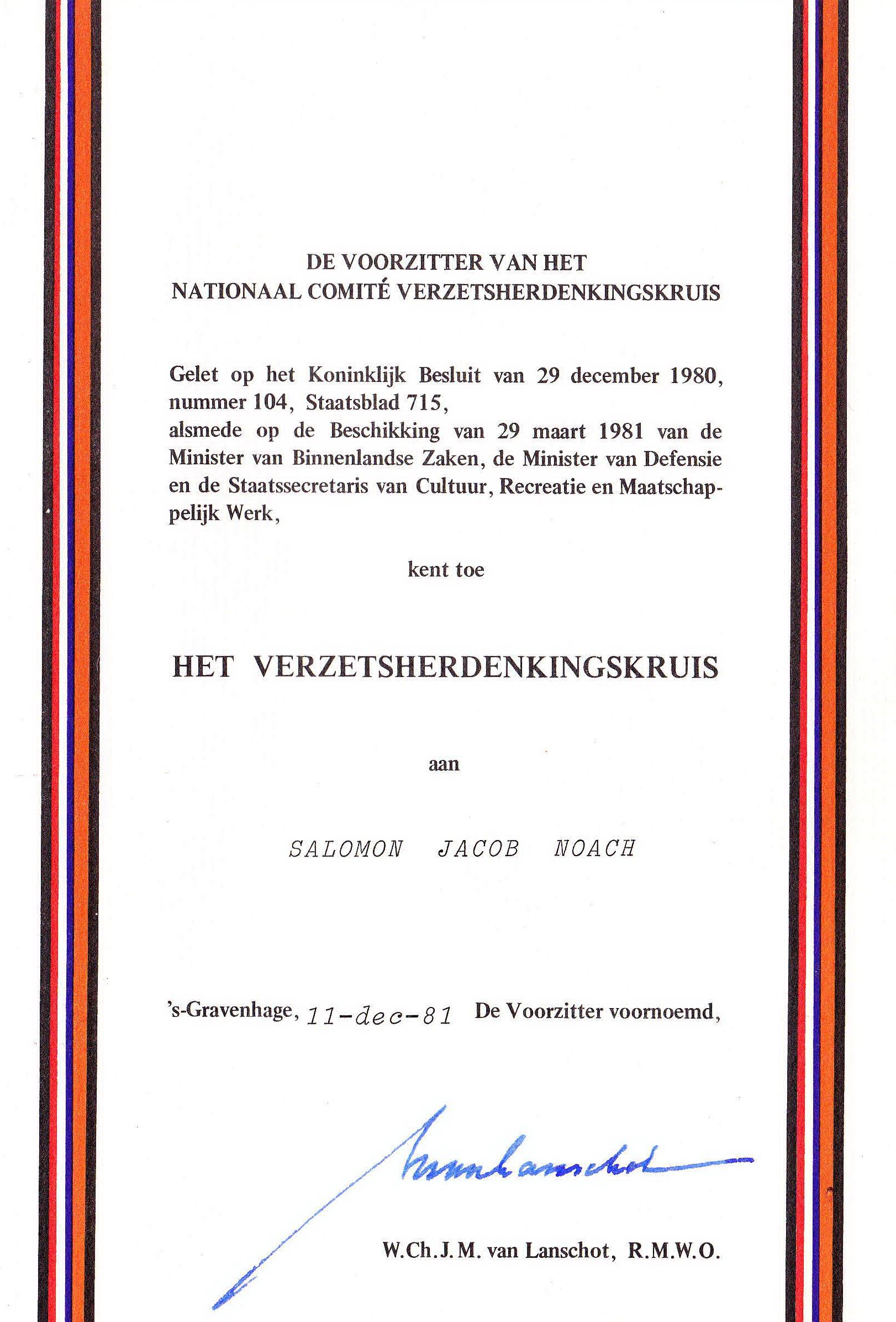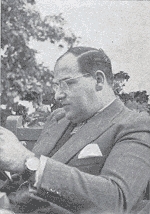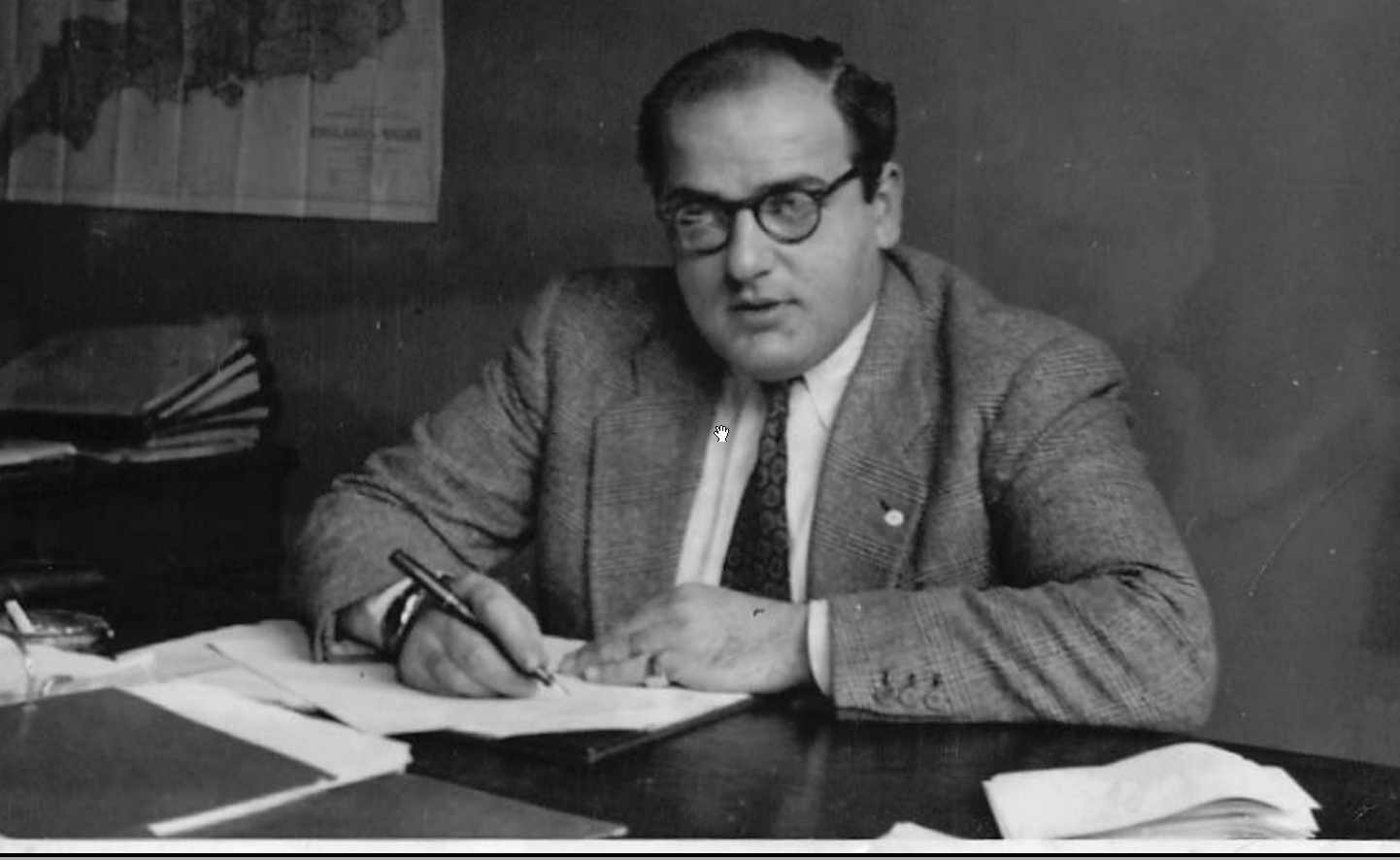Sally Noach the “Engelandvaarder”
From: “Het moest gebeuren” - It had to be done by M.G. Haringman
Sally Noach was born in Zutphen on 28 December 1909. He grew up in a large family with six children: five boys and one girl. His father was dealing in carpets. Sally went to primary school, where he was a good pupil and a member of the local scouts. He liked scouting and he learned much from his guide Wuestefeld. His interest caused a conflict with his school teacher Westerweel, who later became known as a famous resistance fighter. According to Westerweel scouting was a kind of playing soldiers. He did not agree with it. His attitude insulted Sally, causing a problematic relationship between teacher and pupil. As a result Sally left school, which seems to have been no problem at the time.So, at a very young age, Sally started working as a messenger boy for a butcher, earning five quarters a week. After several months he started to think about his future and came to the conclusion that the hotel business would be more attractive. The station restaurant of Zutphen was looking for a bell-boy, he applied and was accepted for three guilders a week. During the coming two years he was promoted and became buffet manager of the third class waiting room. Afterwards he worked in the lunchroom "Suisse" and then in the station restaurant of Zevenaar.
In the meantime his parents had moved to Brussels. Sally's father proposed that Sally also should move there, since there were good possibilities for a young man. He resigned in Zevenaar and moved to Brussels.
Once there he accompanied his father on his business travels. He discovered that his father was a perfect businessman, he was talented and knew exactly when to buy and when to sell. Sally's first commercial area was Gent, where his father had a large circle of clients and relations. At that time his father traded in fabrics. After several days together, he left his son alone in Gent, with a suitcase with fabrics and without money. "He should earn his own money." Sally returned to Brussels with a minimum profit, but nevertheless he was content, since he also earned his train ticket.
His father worked by car. He thought that if Sally also would like to have a car – which was much easier than travelling by train or bus – he had to earn one by himself. Sally got more experience and in 1928 he was able to buy a car of his own. First a Citroen and later on an Opel. His father did not help him, not because he was stingy or indifferent, but he wanted to teach his son to become independent.
In 1929 Sally enlarged his business and moved to Lille, where two of his brothers also lived. In Lille he lived for three years, he learned French there and worked in the North of France, mainly in the commerce of rugs. During that period he earned well.
His trial to establish a market in Switzerland also, did not succeed.
The political development in Europe did not leave him untouched and caused him to worry. He returned to Brussels for a holiday. He was the only child still unmarried, his parents were already happy grand-parents.
It was already 1940, England and France were at war with Germany, and Sally had his misgivings about coming disasters. He preferred to stay in Brussels. The family was very attached to the Dutch monarchy and he was worried about the future.
In April 1940 the mood in Brussels was very tense. People were mobilized, at sea a full war was raging and Dutch ships were already torpedoed by the Germans.
When war broke out on May 10th, Sally's first plan was to leave for Paris. His father preferred to wait a bit and on 13 May Sally decided to go alone. He was not the only one. He struggled through a multitude of thousands of people and finally reached the platform.
The train for Paris was ready. Sally was joined by a young man, named Armand. The train departed with a delay of four hours, and after many more delays reached the Franco-Belgian border after five hours. Some youngsters realized that in the overcrowded train there were women and children who needed help and therefore they started a kind of first aid help. Sally, who had some knowledge in this area, joined this group.
After a long delay the train moved again, and reached a small place near Amiens. There, several items were purchased by the first aid group, like food, drinks, warmed bottles for babies and medical goods.
The French police now entered the train. All people who did not posses a French passport were removed from the train.
All this caused a further delay of half a day, and when the train moved again, it became clear that it would not arrive at the French capital. After a journey with more delays, under terrible circumstances – the train was too crowded and the sanitary equipment did not suit such a ride – the train reached Toulouse. From there it moved again until it finally arrived in Castelnaudary, a village at the foot of the Pyrenees.
In the waiting room there followed a long registration. It took many hours till the suffering refugees were freed from the stench, the dirt, the hunger and the thirst, which had plagued them in the train, during their four day travel from Brussels.
Finally the travelers were divided into groups of hundred people and transported in busses.
The group to which Sally belonged, went to the village of St. Julien, near the Pyrenees. They were received by the mayor, who happily noted that Sally and his friend Armand spoke French.
Sally was appointed as cook of the group and taken to the village inn. The female owner was happy with the extra help. Now the people finally received a regular meal, after which they were divided among different farmers.
As a reaction to the grief of the suffering of the last days, Sally had a crying fit that evening. Everything passed again before his eyes: The crying women, the shouting children, people falling ill, the suffering babies and the physical circumstances. Nevertheless he and Armand were ready to prepare breakfast the following morning.
Breakfast was followed by a lunch of soup, vegetables, potatoes and meat, which was eagerly accepted.
It went on like that, but Sally understood that such a small village would not be able to support a group of hundred refugees endlessly and he decided to contact the Dutch consulate in Toulouse. The mayor gave him and Armand the necessary papers and so they could leave for Toulouse. They were received by van Dobben, the honorary Dutch consul. Sally told him what had happened to them and added that he wanted to go to England in order to join the Dutch fighting forces there. Van Dobben answered that he would not be able to help him. His powers and possibilities were limited and certainly not geared to a state of war.
This man headed a large Dutch enterprise in Toulouse, but he did not dare to show any initiative, without risking a conflict with the people he was subordinated to.
They returned to St. Julien, but after some time they went to Toulouse again, in order to find a way to England, nevertheless.
After meeting a French official in Toulouse they decided to go to Paris, which had not yet been occupied by the Germans. There they were unable to arrange things and so they returned to Toulouse. It turned out that the Dutch consulate in Toulouse had taken a small step and that each Dutch refugee received 16 Francs a day.
Sally refused to accept this amount and tried to earn some money on his own. He maintained his contact with the consulate and one day he even met his brother's family there. In the meantime more and more Dutchmen, who had succeeded to escape from Holland, arrived in Toulouse and Sally understood that many of his compatriots would follow.
In the meantime a kind of reception center was established in Toulouse, but Sally, who in August 1940 was quite well informed about the general situation, decided to contact the Dutch consulate in Lyon. The consul there, Mr. Lambotte, was French and did not speak Dutch. Sally understood that here was a task for him, since problems had arisen with Dutchmen who did not speak French. He also helped his brother ,who was worried about the fate of their parents, to return to Brussels.
He contacted Mr. Lambotte again and was appointed as a "non salaried employee". In order to support himself, Sally started his commerce again, but now in Lyon. In this way he met many people, who proved to be of use to him later on. He contacted the firm Bouchera and in December 1940 he made contact with Samani, a wholesale dealer in Persian carpets. He returned to the trade in Persian carpets and his free time was dedicated to his work at the consulate. More and more Dutchmen arrived, and thanks to the many contacts he had made, he was able to really help them.
He met colonel Paul Marx, judicial investigator with the Military Tribunal in Lyon, who appointed him as interpreter with his Tribunal. Sometimes Dutch refugees were imprisoned without blame and had to appear before the Tribunal. Due to his connections with colonel Marx, two of them could be freed.
In the meantime, in the Vichy part of France, food was becoming scarce. Sally kept himself busy with providing food for the refugees and for the England sailors, arriving at the Dutch consulate in Lyon.
Some of these people were arrested by the French police, and detained in camps or prisons, which certainly was no pleasure. Through his connections with the consulate, Sally met the camp commanders, enabling him to solve matters concerning detained Dutchmen.
In order to assist these people also financially, he erected a special fund. He quickly noted that assistance to these refugees was regarded by the Dutch authorities as "illegal," not allowed according to the consular rules. But he was of the opinion that those people had to be assisted, with or without rules. And so Sally provided them with clothing, shoes and also medical help.
Consul Lambotte passed away, but Sally was also on good terms with the new consul. In 1941 the Dutch consulate was degraded and it's official status was taken away. From now on it was called "Office Neerlandais." This made no difference to Sally, but the change proved to be the subordination to the Vichy regime, which was influenced by the conquering Nazi regime in Paris. It was also the end of the diplomatic recognition of the occupied countries, whose governments were not acknowledged anymore.
It was astonishing to note how often fleeing Dutchmen were not aware of the complicated situation in which they were involved. They stayed in France without valid papers, which certainly opened the prison gates for them.
Often these young men were arrested as a group, either immediately after leaving Holland, or when meeting each other during the journey.
"Food" remained an important factor in the care for these people. In spite of the difficult situation in France, Sally knew how to find addresses where food was available.
Furthermore he constantly had to provide financial means. The money usually came from private hands, from Dutch merchants who had taken up their residence in Lyon. The solidarity was great. That was not so simple, because during the middle of 1941 the influx of refugees became greater. Mr. Kolkman, the consul of Perpignan, who was later executed, helped him very much.
In the Vichy area the situation was not so simple, many England sailors were arrested there and put into camps or prison. Sally, providing food and good meals, had good connections with camp commanders and jurists, which enabled him to free a great part of these prisoners from jails at places like Macon and Lons de Saunier. This was not regarded as bribery, but simply as the French way of doing things.
Part of the refugees tried to continue reaching Switzerland, however the route Holland-Switzerland was extremely difficult. Many refugees were arrested by the Dutch, Belgian or French authorities and even when they succeeded in reaching the Swiss border, they were stopped by the Swiss police, who returned many of them.
Those who happened to reach Vichy-France, were in a certain sense better off. If they were arrested – sometimes in groups – they were put in the Annecy prison, where Sally had his connections.
For his travels Sally needed permits. He himself "arranged" the necessary papers and stamps. Regarding his travels there were seemingly no problems. From the Annecy prison, Sally succeeded in freeing amongst others, Ernst Voorst tot Voorst, the son of a well known Dutch general.
As a result of the persecution of Jews in Holland, more and more non-Aryans arrived in Lyon. As Sally considered the situation in Vichy France less and less trustworthy, he thought it advisable not to register the Jewish refugees anywhere. He took care of their needs circumventing the Dutch Office, and looked for trustworthy French addresses.
The young men arriving from Holland were still interested in reaching England, in order to enlist with the Dutch forces there. Toulouse, as mentioned before, was an important spot on this route, because since 1940 there were two reception centers for Dutchmen. Sally's endavours were to try to improve the situation there. It was important to obtain a valid visum to Spain and Portugal, without which, great difficulties in those countries were to be expected. Both countries were slow in providing a visum, and precious time was spent with this procedure. Especially young men encountered difficulties.
In the meantime, the situation of the Jews in Holland had become very dangerous. Sally was personally involved, because part of his family had already been deported. Therefore he decided to intensify his assistance especially for Jewish refugees. The first and most important step in this connection, was to obtain a French identity card.
It was quite easy to acquire such a document. They were sold blank, one had to fill in all details, to add a recent passport picture and to show them to the French authorities. After approval and payment of the legal dues, the card was signed and stamped by the official and became an official document.
"Suspicious entries", like Jewish names, were changed by Sally and any religion was suitable, with the exception of the Jewish one of course.
The next step was the visa problem for Spain and Portugal. A Spanish consul, Jaquet,
offered cooperation and in Lyon cooperation was received from the Dutch military attaché in Bern, general van Tricht.
The Vichy regime was entirely rotten; people like Laval and Darlan were regarded as
criminals by most Frenchmen. Most Frenchmen wanted to be free, which could be noticed in daily life. Therefore the Dutch Office in Lyon found much support and many Frenchmen supported the Dutch case.
In 1941 the Office functioned in a peculiar way, a mixture of an escape organization for arrested Dutchmen, travelling agency and a social service. Active were Jacquet, his secretary and Sally Noach.
In 1942 still more assistance was required from the Office. The number of arriving Dutch Jews was higher than in 1941. The situation of Vichy-France became similar to Paris, where razzia's were already held. Sally was on his guard and kept assisting younger men, who would be able to join the Dutch army in England.
About June 1942 the situation in Vichy worsened, especially the food situation. Sally appreciated the assistance of colonel Marx in this matter.
Now he started receiving messages from the police in Lyon, warning him that difficulties for the Jews were coming. At the end of July 1942 Sally was informed about the existence of the transitional camp Drancy and at the beginning of August he was warned by the head of police in Lyon, that razzia's for the Jews were planned.
Sally changed his identity to Jean Desbonnets.
There were changes in command ranks. Frenchmen who were not willing to execute Vichy commands were ousted.
On 30 August 1942 the first razzia in Lyon took place.
Sally, with much daring, succeeded to free a large group of Dutchmen from prison, promising that they would receive official registration, which was arranged immediately by the Dutch Office. The next day it turned out that other Dutchmen were transported to the Iris stadium. From there Sally was also able to save many of them, by providing them with legitimate papers, fabricated by himself.
Day by day Lyon became more and more unsafe and in October 1942 the situation became critical.
During that period Sally's nerves were sorely tested through the enormous quantity of work, but also due to the message that his parents were transported in September 1942.
In the meantime the French resistance got stronger, which caused the Vichy regime to combat its rivals and to fight those French who did not cooperate with Vichy collaboration. As a result the Dutch Office started to attract the attention of the Vichy agents.
Mr. Jacquet realized that their work had become more dangerous and he advised Sally to flee to England as soon as possible. Sally possessed a "Libre sortie de France" with the required stamps and he reached Spain at the last moment. On 11 November 1942 the Germans conquered the "free" part of France, only two days after Sally had crossed the Franco-Spanish border!
Via Barcelona he went to Madrid, to the Dutch embassy there, but he noticed that it was better to proceed on his own power and with his own means. In Madrid he found some rest, but the extraordinary stress, from May 1940 on, started to take its toll. He did not give in, he had to go on. He obtained a Portuguese visa and reached Lisbon without further disturbance. He went to the Dutch embassy there and was coolly received by Baron Harinxma thoe Sloten, who also managed the Red Cross, which took care of the refugees.
The Baron had obviously heard about Sally from Dutchmen who were active in France. He was not content with the criticism uttered by Sally on the little interest shown by Dutch officials to Dutch refugees, including Jews.
London had decreed that Sally should rest well before making the passage to London. In France he had had many discussions regarding the importance of helping Dutch refugees, even when this required a "breaking of rules." These discussions earned him the title of a "troublemaker." But Sally never forgot that due to the "legality" so beloved by the Dutch authorities, many people, some of them in deathly danger, could not be saved. The sluggishness with which Dutch officials in Vichy worked, had been the cause of many disasters.
In Lisbon Sally received more news about his deported parents. He was happy to hear that his brothers were able to reach Switzerland safely.
At the start of 1943, Sally finally reached London. He was received by the famous spy catcher, colonel Oreste Pinto. The professional reputation of this man was unequalled and he proffered great service to Holland and to the allied powers. He had a special sense enabling him to spot the unreliable elements amongst the “Engelandvaarders”, the escapees to England . He acted moreover without bias and didn't care what people thought about him, which drew a lot of criticism. He had a long conversation with Sally, gathering as much information as possible. In London Sally found time to think about what had happened in France during his stay there and he composed a detailed report about that period.
Almost immediately Sally arrived in "Oranjehaven," the home donated by Queen Wilhelmina to the Engelandvaarders . There he met several young men whom he had assisted in Lyon and was received with loud cheers.
Because Sally did not feel too well, he passed a medical examination, leading to the conclusion that he was in shock. The Dutch department of National Affairs ordered him to rest at a home, were other citizens and sailors were also recovering.
After several weeks of good care and total rest, an important visit was announced.
The visitors were Gerbrandy, the Dutch minister president, van Boeyen, minister of war, minister of state Beelaerts van Blokland, and Tets van Goudriaan, representative of Her Majesty the queen.
Sally was quite astonished by this visit, but he was also touched. Minister Gerbrandy welcomed him in name of the Dutch government and minister van Boeyen thanked him for his work in France. Minister Beelaerts van Blokland offered the appreciation of the ministry of war, since Sally had paved the way for escapees to England, to enlist in the Dutch forces. Tets van Goudriaan received him in name of the queen.
Sally never thought about thanks or honor. He regarded his actions as duty only. The visit was followed by a long conversation during which Sally gave a detailed report. Sally was outspoken and gave an honest opinion regarding the Dutch representation in France, which seemed often too neutral and old fashioned.
Ten days after this conversation Sally received an invitation to visit Her Majesty Queen Wilhelmina at her residence in Chester Square. Naturally he accepted the invitation. He was collected by car and received by Francois van het Sant, which he would meet again at a later date. He had lunch with the queen followed by a long conversation.
Sally was requested by several departments to give information about his experience in France. At the end he was interviewed by the Governmental Information Service, where he met the Dutch journalist and radio speaker, Meyer Sluyser. Sally told him that the queen had suggested that he write a report for her on his experience in France.
Sluyser offered the use of his office for the writing of the report, and also gave him a secretary for the typing. The finished report was delivered to the secretariat of the queen. At the time there were different Dutch information services, more or less in competition with each other. After the war the report found its way to the National Institute for War Documentation in Amsterdam. Sally was sometimes attacked, because of the criticism contained in his report. He was invited to minister van Kleffens, of Foreign Affairs, which certainly was an unpleasant meeting. The minister felt passed over, because the report – which belonged to his ministry - was delivered directly to the queen.
After a short time Sally was summoned to the department of internal affairs, where a function was reserved for him. Sally was quite astonished, because he had been approved for military service and he thought that he would be a part of the active service. But the ministry of war had concluded that he would be more useful in another function.
He was received by van der Putten and placed in the documentation department. He had to check details concerning occupied Holland, and personal details of NSB members, which were all entered in a huge card system, managed by major Olifiers. Sally worked with daily newspapers, magazines and other Nazi publications, as well as with papers of the resistance, which all reached London. The information gleaned was actual and accurate, giving Sally an excellent picture of what occurred in his conquered home country.
Around Christmas 1943 Francois van het Sant invited Sally again, and he discovered that Sally had to manage with seven Pound Sterling per week, an amount not affording him much to spend. As a result he received a Christmas present from the queen of 25 Pound Sterling and after some time he received a part-time appointment from Van het Sant with a monthly income of 40 Pound Sterling. He also continued his first job with internal affairs.
Since he had to be a few times a week in Chester Square, he met the queen from time to time and he also met princes Juliana during her visit to England.
Two important persons, who should not be forgotten were Saal and Mamie van Swaanenberg. Their family became a real home for many people in need of rest and recuperation, also for Sally.
During one of the meetings between Queen Wilhelmina and Sally, the subject of the expenses paid by Sally in assistance of the “Engelandvaarders”was mentioned. He told the queen that the official authorities did not partake in this expenditure. Therefore he had to beg for money from well-to-do Dutchmen and some part of the expenses were paid personally by him. The queen advised him to file a claim with the department of internal affairs.
Since Sally did not know exactly the amount in question, he asked people whom he had assisted, to help him in this matter. In the end it turned out that he had to contact the ministry of war, where he was not treated too well. Finally he gave up and waived his claim.
Sally had many experiences during wartime in London. He was a regular visitor to "Oranjehaven", the home of the England sailors, where he often met the queen and also prince Bernhard. He had great admiration for the British behavior during the terrible bombing of their towns.
After the liberation of the South of Holland, queen Wilhelmina paid a visit there, and returned unwell. She wished to use a certain brand of eau de cologne and Van het Sant asked Sally whether he knew how to obtain it.
Sally had just been in liberated France and he happened to posses that kind of eau de cologne, which he offered the queen without delay.
During one of his visits to France, he met Mr. Jacquet, who had offered him so much assistance during his stay in Lyon. This man, seriously harmed during his stay in German concentration camps, fretted that the Dutch had not reinstated him, and had not returned the title of consul of Holland to him. Sally decided to bring the subject up in London, even by mediation of the queen. Finally a favorable result was reached and Jacquet was appointed as "honorary consul" in Lyon.
After the war Sally was honorably discharged from his activities, with thanks for his services to his country.
Sally did not object to his discharge, since he wanted to regain his independence and to return to commerce. But he remained in the queen's service.
So he remained in London, where he found his wife. She was secretary to several ministers. In 1946 they got married.
Sally tried to rebuild his commerce in Persian carpets. This was not easy at all, since the Dutch government was very cautious with foreign currency transactions.
Sally succeeded in adhering to the foreign currency regulations and was able to purchase a great quantity of carpets in Persia. He was proud to be the first Dutch businessman able to present Persian carpets after May 1945. Finally he was able to supply carpets to other tradesmen, as a respected wholesale dealer.
In February 1947 he returned to Holland by boat with wife and baby, but could not find a flat. He lived in Zandvoort till he found a flat in Amsterdam.
When he became 60, he received a decoration from the queen. Sally had expected something like that, because Major Olifiers was also a member of the Decorations Commission. He and minister Albarda hinted that Queen Wilhelmina planned to give him a decoration. Nothing happened however. Later on it turned out that van Kleffens from foreign affairs had tried to slow down the procedure, obviously as a reaction to Sally's past criticism on the Dutch officials in France. Finally the decoration was given to him at Soestdijk Palace, by Queen Juliana and Prince Bernhard, in 1969- when he became 60 years. Sally was the first one to receive the Cross of Honor of Oranje Nassau, a distinction instituted only seven years earlier.
Afterwards there followed a reception at the Doelenhotel, with many friends, “Engelandvaarders”, former resistance fighters, officers and officials.
Sally thankfully felt that "he had done what had to be done."
He passed away in Amsterdam in March 1980.
On 11 December 1981 the Cross of Resistance Remembrance ("Het Verzetsherdenkingskruis") was granted to him posthumously.
Source:
M.G. Haringman, "Sally Noach. Het moest gedaan worden",
1971, uitgeverij Semper Agendo, Apeldoorn, paperback, 136 p. (met foto's)
Extracted from the source:Yael Benlev-de Jong
Translation into English:Mechel Jamenfeld
Editing:Ben Noach
Final review:Hanneke Noach
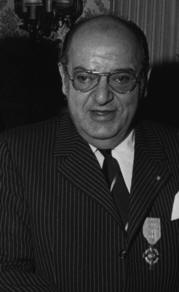 |
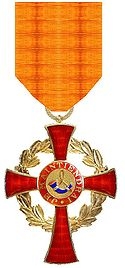 |
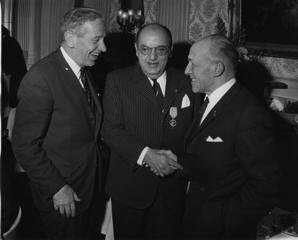 |
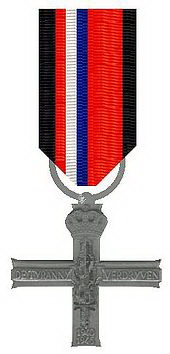 |
